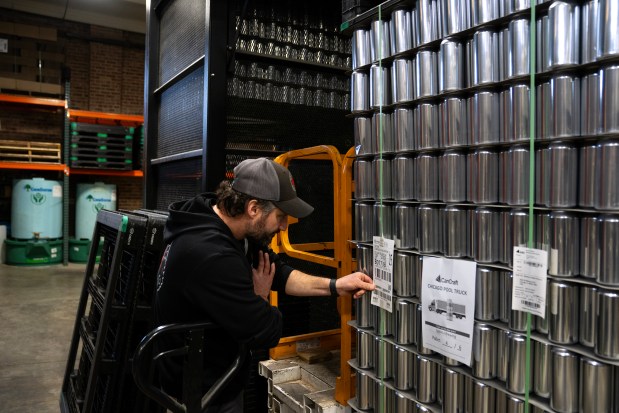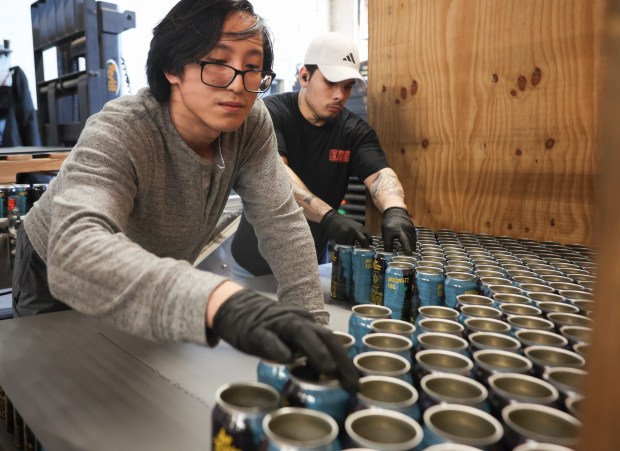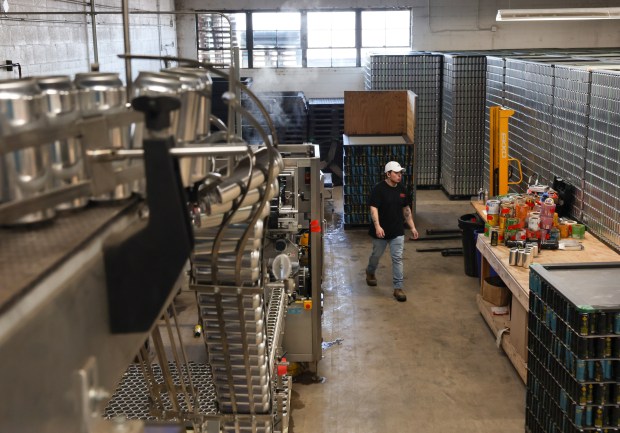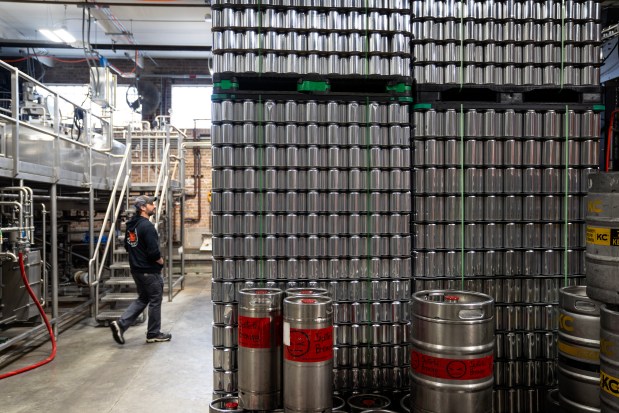When two northwest suburban childhood hockey pals launched Spiteful Brewing in 2012 as a post-collegiate enterprise, the business overcame long odds to grow from a stovetop startup into an award-winning craft brewery and tap room in Bowmanville.
But after successfully navigating everything from the pandemic to a flat craft brewing market that has forced several Chicago competitors to close, Spiteful faces an imminent new challenge: tariffs.
President Donald Trump’s 25% tariffs on imported aluminum, set to go into place March 12, will raise the cost to produce every whimsically adorned can of Spiteful beer, from its Working for the Weekend Double IPA to its Fat Badger Ale.
For Spiteful and other Chicago craft brewers, the results may be inevitable: libation inflation.
“Imagine something that you’re buying every day goes up 25% overnight,” said Jason Klein, 42, co-founder of Spiteful Brewing. “We would have no choice but to raise prices — there’s no way we can absorb that.”
A niche segment of the beer industry, craft brewing has become big business in Illinois, with hundreds of mostly small manufacturers generating $3.1 billion in economic impact in the state in 2023, according to the Brewers Association, a Colorado-based trade group. But after years of explosive growth, craft brewers have struggled in the post-pandemic landscape amid a glut of competitors, with a number of high-profile brewery and taproom closings in the Chicago area. Tariffs may be another blow.
Beyond malt, hops, yeast and water, aluminum is a key ingredient in the manufacturing process, used to make the cans for most of the craft beer sold at retail.
The 25% tariffs on imported steel and aluminum, which Trump announced Feb. 10, are projected to significantly affect a number of industries, including automobile manufacturing, construction, electronics and packaging. The U.S. imports roughly half the aluminum used in manufacturing, with Canada by far the largest supplier, according to data published this month by the Council on Foreign Relations.
For the craft beer industry, which depends heavily on aluminum cans from Canada, the 25% increase will hit hard, according to Klein. Spiteful Brewing annually sells nearly a half-million cans of beer, which it distributes to retailers throughout the Chicago area.
The three largest U.S. can manufacturers are Ball Corp., Crown and Ardagh, according to data from IBISWorld. Some craft brewers buy their cans through suppliers, who deal in large volumes and act as middlemen with the manufacturers.
Spiteful buys its cans directly from Ball, a Colorado-based company and the largest U.S. manufacturer. All of the cans delivered to Spiteful are sourced from Canada, Klein said.
“For us, in packaging, it’s probably the most expensive part of what’s in a six-pack,” he said.
A typical Spiteful six-pack sells for $11.99 on store shelves, Klein said. He expects the retail price to go up at least $1 per six-pack after the tariff hits.
Started as a homebrewing hobby in the 1980s, the commercial craft beer industry has grown exponentially during the new millennium, expanding from 1,566 breweries to nearly 10,000 as of 2023, according to the Brewers Association. California, Pennsylvania and Texas are the three biggest craft brewing states.
Illinois ranks 13th in the nation, with 305 craft breweries as of 2023, up from 68 in 2012 — the year Spiteful Brewing launched.
Nationally, craft brewers represented 13.3% of domestic beer production in 2023, up from just 5% in 2010, according to the Brewers Association. Sales of craft beer accounted for nearly a quarter of the $117 billion U.S. beer market — including imports and other domestic products — in large part due to higher price points.
But craft beer sales have been stagnant since the pandemic hit, with volume down 10% in 2020, up 8% in 2021, flat in 2022 and down 1% in 2023, according to Bart Watson, president and CEO of the Brewers Association.

The final numbers are not yet in, but Watson expects craft beer sales to have declined in the “low single-digits” in 2024.
Not surprisingly, craft brewery closings have rivaled openings in the post-pandemic landscape. In 2023, 493 craft breweries opened and 405 closed, including taprooms, brewpubs and microbreweries, according to the Brewers Association.
The Chicago market has seen dozens of prominent casualties in recent years, including Metropolitan Brewing, one of the city’s oldest craft breweries, which filed for bankruptcy and closed in 2023.
In December, Revolution Brewing, the largest craft brewer in Chicago, closed its money-losing Logan Square brewpub while keeping its Avondale taproom and brewery open.
Another pandemic-era phenomenon is the increased reliance on cans. Early 2025 sales data show aluminum cans account for 75% of packaged craft beer’s volume and revenue, according to the Brewers Association.
Spiteful buys plain aluminum cans and applies an array of colorful cartoon labels during the packaging process to market its portfolio.
“That really started for us during the pandemic when we were like 70% draft, and then it went away overnight,” Klein said. “So we had to pivot, and we purchased the labeler because it allowed us to essentially can everything.”
During his first term, Trump imposed 10% tariffs on imported aluminum in 2018 but provided exemptions for Canada and Mexico, while the Biden administration rolled back the tariffs on the European Union.
This time around, the imminent threat of 25% tariffs on aluminum from Canada looms even larger for craft brewers.

BevWrap, a seven-year-old labeling company in Elk Grove Village that provides cans to a number of Chicago-area craft brewers, hopes to sidestep the tariffs by using domestically sourced cans through its supplier, Chicago-based Berlin Packaging.
But if BevWrap does get hit with the tariffs, it will have to pass along the price increases to the brewers.
“It is a daily conversation with customers and vendors,” said Ralph Drozt, BevWrap’s founder. “If there is a price increase, I’ve got to kind of reassess and look at the business and see how much of that we can absorb and how much has to be kind of passed on.”
BevWrap prints labels and distributes 10 million cans a year, investing more than $1 million annually to acquire the aluminum containers and materials, Drozt said. Chicago-area craft brewery customers include Steep Ravine, Moor’s, Old Irving, Mikerphone, Pipeworks, Miskatonic, Marz and Hop Butcher.
The company also labels cans for makers of cannabis-infused drinks.
Drozt, who hasn’t had a price increase since launching the business in 2018, said he was able to bring down his costs this year by switching can manufacturers from Ardagh to Crown through his supplier.
If the 25% tariffs bring his can costs back up, Drozt said, his customers will see a price bump that may be hard to swallow for some struggling craft brewers.

One of those clients, Steep Ravine, a 10-year-old craft brewer formerly known as Ravinia Brewing, is busy building a new brand after agreeing to change its name in November to settle a trademark lawsuit with Ravinia Festival.
The Highland Park-based craft brewer also just reopened its Logan Square outpost this month in partnership with Chicago-based Moor’s Brewing, rebranding the taproom/sports bar as Diversey House.
Kris Walker, co-founder of Steep Ravine, said thin margins will force craft brewers to raise prices to cover their costs associated with the 25% aluminum tariffs.
“Regardless of their true costs, I think smart operators are going to take the opportunity to raise the price in advance of their real cost hitting them,” said Walker, 49. “I think everyone’s going to see the prices go up.”
Steep Ravine sells four-packs of 16-ounce cans, generally for $11.99 at retail, Walker said.
With some craft brewers struggling financially, Walker said he expects major brewers like Molson Coors and Anheuser-Busch to hold the line on prices — despite the tariffs — putting the squeeze on smaller competitors.
“I would be playing the game right now to see if this is really the time that can break the craft beer industry,” Walker said. “If they (the big companies) can keep things under $9.99, craft beer guys are either going to have to take more margin loss than they are in order to keep matching it, or they’re going to raise the price. I do think there’s a major risk to the craft industry as a whole.”
Klein remains hopeful that Spiteful will navigate the tariffs successfully.
At the same time, he questions the efficacy of the Trump tariffs — ostensibly meant to promote American manufacturing — and its real impact on small businesses and their customers.
“I don’t know what it will ultimately accomplish, really, other than higher prices for everyone,” Klein said. “Once they go up, they don’t tend to come down.”
rchannick@chicagotribune.com



